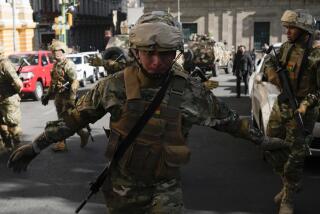Peru Raid Fails to Net Former Spy Chief
- Share via
LIMA, Peru — In a dramatic show of force apparently intended to reassert control over a crisis-torn nation, Peruvian President Alberto Fujimori on Wednesday led an unsuccessful commando operation to hunt down his renegade former spy chief.
As an army helicopter circled overhead, Fujimori led a caravan that zoomed into a hillside community outside Lima, the capital, about 5:45 p.m. The more than 150 elite troops--a mix of army, navy, air force and police commandos--searched for fallen intelligence director Vladimiro Montesinos, whose defiant return from exile in Panama three days ago caused a new political uproar.
The grim-faced president directed the operation from a maroon sport-utility vehicle with plainclothes bodyguards hanging from the sides. The three-hour raid ended at a home reportedly frequented by Montesinos in Chaclacayo, a semirural area where military officers have country houses near an army training facility.
At 9 p.m., the president told reporters over a megaphone that the commandos had failed to find Montesinos. Fujimori said the hunt, which targeted five areas, would continue around the clock. In a sign that Montesinos may retain enough power to strike back, the president placed the armed forces on nationwide alert and prohibited unauthorized movements by the military.
Fujimori gave a somewhat complicated explanation for the sudden use of force against his former right-hand man, whom he has defended even in exile. The president said his goal was to “locate, not arrest” the former spy chief and promised to respect Montesinos’ rights.
But Fujimori said Montesinos had returned against the president’s will and provoked instability. He said Montesinos could face prosecution if he is found.
“One man alone cannot create such an inadequate climate, especially at a time of transition,” Fujimori said. “It is not my role to make arrests. But I must find him to give tranquillity to the nation. . . . The judicial and legislative systems will take the appropriate measures.”
The president’s actions were the latest and most concrete sign of a struggle with Montesinos. The spy chief has remained out of sight, reportedly protected by military allies, but he gave a rare radio interview Tuesday that was interpreted as a taunting of the president.
Fujimori has apparently decided that the immediate survival of his government depends on a definitive defeat of Montesinos. On Monday, the president began a methodical offensive intended to dismantle the remnants of the spy chief’s massive power network in the National Intelligence Service, or SIN, and military and other agencies, U.S. and Peruvian officials said.
“President Fujimori is removing people from positions who were arguably more loyal to Montesinos than to him,” a senior U.S. official said. “I think the president is clearly in charge, and he has the support of the military.”
Reacting cautiously to a political scene that has turned increasingly strange, analysts praised Fujimori for taking decisive action after weeks of seeming paralysis. Critics had said he was unable or unwilling to confront the reviled Montesinos, whose foes accuse the spy chief of corruption, human rights abuses and political dirty tricks.
Fujimori’s 10 years in office have featured a number of daring military operations that cranked up his popularity. A spectacular commando assault in 1997 freed 71 hostages who had been held by terrorists in the Japanese ambassador’s residence for four months.
During those incidents, Montesinos was Fujimori’s indispensable and all-powerful intelligence chief. Now he is the top threat to the stability of democracy here.
And the failure to find Montesinos is likely to feed tension and uncertainty. The former spy chief could retaliate with violence or destabilizing maneuvers. Montesinos allegedly threatened to launch a military coup last month when the president ousted him.
Fujimori acknowledged Wednesday night that Montesinos, who previously surrounded himself with an elite personal security force, probably has the help of “an organization.” The spy chief’s lingering aura of omnipotence makes it difficult to know whether his recent moves are part of a calculated plan or the flailing of a doomed kingpin.
Projecting the image that he controls a military command stacked with onetime Montesinos allies, Fujimori spent recent days visiting military bases with an entourage of generals and an unusually large contingent of bodyguards carrying machine guns. During those visits, the president supervised either the arrest or the “reassignment”--according to differing versions--of at least five colonels seen as Montesinos loyalists.
Fujimori veered between stealthy military operations and public diplomacy Wednesday. In the morning, he met with the chief of the Organization of American States and renewed his promise to hold early presidential elections next spring and then step down July 28.
OAS Secretary-General Cesar Gaviria had hurried to Lima on Tuesday to revive negotiations between the government and the political opposition that were suspended after a U.S.-backed agreement to seek political asylum for Montesinos in Panama broke down.
Fujimori told Gaviria that the latest crisis hasn’t jeopardized the democratic transition he announced last month after a corruption scandal toppled the spy chief and forced Fujimori to cut short his five-year term only months after his reelection.
On Wednesday night, Gaviria announced an accord to hold the elections April 8. The government and opposition also agreed to consider a proposed amnesty for officials of the security forces and government, a measure that is bitterly opposed by prominent Fujimori opponents.
In addition, Gaviria praised the decision to capture Montesinos, saying he hoped that it signaled “a new chapter in Peruvian history.”
U.S. and Latin American diplomats appear convinced that the president should not resign immediately, as some critics demand. Instead, Gaviria and other diplomats want to push forward Fujimori’s plan to oversee institutional reforms needed for a clean vote next year, seeing his government’s survival as the best recipe for stability.
More to Read
Sign up for Essential California
The most important California stories and recommendations in your inbox every morning.
You may occasionally receive promotional content from the Los Angeles Times.













